There’s a few people in Boulder, a generally green town, who embody “the mindful life”—elephantjournal.com’s editorial mission. They’re walking to the beat of their own drummer, living super-green and doing so with an infectious sense of joy. Because fundamentally all this eco green hype ain’t about a fad any more than yoga or Buddhism are fads. All these things are simply about “living a good life that also happens to be good for others, and our planet.” A responsible life that’s karma-free, and hopefully leaves the world a bit better than we found it.
Mark at Conscious Coffees is one of those people. Whether it’s a coffee cupping at Pekoe, or maniacally cleaning out his plastic coffee containers so they last years and years instead of a year or two (every piece of plastic ever made still exists, remember), or returning his white plastic coffee bean bags to Eco Cycle to get recycled (the FDA won’t allow him to reuse them because of the oils, crazy), or biking six huge boxes of fair-trade coffee around and enjoying doing so, or making custom blends for favorite local merchants like Lolita’s, a longtime Boulder fixture, or donating not only not just his profits but every dime from his overwhelmingly busy weekly coffee table at Farmers’ Market to BMOCA—and even donating his and his staff’s labor—that’s $400 or $500 in cash each week to BMOCA—or being the only company I know to eschew those metalic coffee bags in favor of infinitely reuseable, returnable coffee containers…Mark, Mel and company walk their talk. I love them.
[slide]- I’m goin’ along from opening of Clutter consignment shop and see this sweet bike laying down in front of Lolita’s with Brooks saddle…
- better photo of saddle, stylish, classic, also little fanny pack dealy below it, this bike is dialed
- and the cart is sweet, six huge heavy boxes and a kind of brushed steel look. Sweet. Would something like this work for Redford, my dog?
- Ah! It’s Mark of Conscious Coffees. Of course. Who else. For half an hour, we talk while he cleans out his coffee containers so they last, don’t get trashed.
- He lets me put an elephant sticker on the back. He wants the yellow one.
- Apparently these containers have to get trashed after two years or so. Unless you assiduously clean the oils and gunk out of ’em, in which case they can last almost forever.
- Ah, Lolita’s. Old historic building, the local grocery’s been here forever. Getting redeveloped green next year, should be cool if a little sad. One of last great views of Flatirons downtown. Though I dig density.
- how the big heavy cart is affixed to the bike. Triangle on a triangle = strong.
- Bikes at Work, Inc. is the cart company.
- Conscious Coffee’s blends.
- Click photo to see big.
- Click these and read the text if you like.
- My kind of aromatherapy.
- Mark & Co collect these bags and then recycle ’em at Ecocycle, a hassle he doesn’t mind being mindful about.
- Still cleaning various dispensers, half an hour later. Still smiling, too.
- Reusable coffee container instead of those metallic throwaway bags that fill my kitchen trash can.
- Conscious Coffees.
The inception of Conscious Coffees in 1996 began with the simple idea that coffee is a truly unique and wonderful beverage that lacked legitimate representation throughout Colorado. We are a wholesale roasting company committed to importing and roasting single origin coffees, sourced directly from indigenous producer groups. These coffees are certified organic and grown on small family farms which have been collectively self-organized into cooperatives. We purchase directly from these cooperatives through our green coffee importing cooperative (coopcoffees.com), eliminating exporters, importers, and middle men. This direct trade relationship provides a solid foundation from which reciprocal exchanges mutually benefit all parties. Our mission is to create long-term relationships with our growers, customers, and the environment, which transcend volume and profits, and emphasize cup quality, human rights, and sustainability. We are proud members of the fair trade federation (fairtradefederation.org)
We focus on determining the perfect roast profile for each harvested crop, maintaining freshness of roasted coffee, and the intricate science necessary for perfect brewing. We constantly educate and train our wholesale and retail customers in areas of coffee storage, grinding, brewing, and enjoying. Coupled with that, we educate everyone possible regarding the social, environmental, and economic impacts of coffee growing, harvesting, processing, and trading.
We are fiercely committed to a set of low impact business practices. This includes minimizing the amount of packaging we use for our product, and taking responsibility for that packaging. Each week we collect back the empty plastic bags we distributed our coffee in and recycle them at ECO Cycle in Boulder. We refuse to package our coffees in the common foil-lined valve packages found on supermarket shelves simply because there exists no outlet for the used package other than landfill. For retail shelf packaging we use US-made steel cans (75% post-consumer recycled content) which are re-usable and recyclable. We re-use everything possible, recycle and compost almost all of the by-products from our business activities, bike deliver all of our coffees locally in Boulder with a 300 lb. capacity Bikes At Work trailer, use 100% post consumer waste paper products, distribute our empty burlap bags and coffee chaff to local farmers, and buy our supplies as close to our local source as possible.
We believe that our responsibility is to use the vehicle of business as a force for positive change, not as a vehicle to gain wealth at the expense of others. Each person in our cycle from farmer to consumer is able to participate in an economic, socially just, and environmentally responsible partnership.
 Share on bsky
Share on bsky





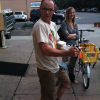



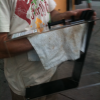



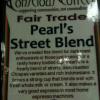

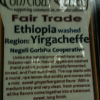
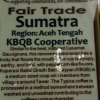


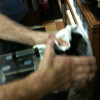
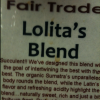







Read 1 comment and reply